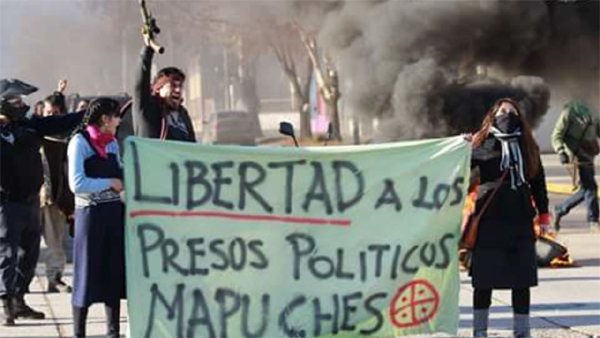
Last week, “tensions escalated between Argentine forces and the Indigenous Mapuche community as tactical teams and anti-riot units sent after the Lafken Winkul Mapu community occupied areas of Villa Mascardi,” we wrote in last Thursday’s LADB. According to Infobae, seven women, including one pregnant woman, were detained during the operation, which aimed to evict the Mapuche community from public and private lands in the southern province of Rio Negro. Four of the detained women are currently being held in a prison in Buenos Aires province, but it is unclear if they have been formally charged. Government spokeswoman Gabriela Cerruti claimed that the operation “was done in compliance with all protocols and without the use of lethal weapons,” and that “there was no violation of the rights of the people there,” according to Reuters. Aníbal Fernández, the country’s Security Minister, also claimed that “there was no repression” conducted against the Mapuches during the operation, reports MercoPress.
The conflict led Elizabeth Gomez Alcorta, Minister for Women, Genders, and Diversity, to resign in protest on Friday, writing that the police’s actions “are incompatible with the values I defend as a political project,” reports CNN. Gomez was the first to lead the country’s Ministry of Women, Genders, and Diversity, created in 2019 following Alberto Fernández’s inauguration. President Fernández is expected to name her replacement today, in addition to replacements for two other cabinet positions, following the resignations of the Labor and Social Development Ministers on Sunday, according to Bloomberg.
The Mapuche nation “once spanned large swathes of territory in the Argentinian and Chilean Patagonia region,” writes CNN. Over the years, though, clashes with cattle ranchers and shepherds, as well as law enforcement and land grabbers, have caused a decline in the community’s numbers and territories. As Infobae notes, the past years have seen an increase in Indigenous communities pushing to reclaim the land they see as rightfully theirs, creating tensions and occasionally confrontations and violence with local and national authorities.
More Argentina
- Argentina is set to tighten import controls beginning on October 17, reports Reuters. The move is meant to “prevent fraud and preserve reserves of U.S. dollars.”

Bolivia
- Last week, the Cámara Agropecuaria del Oriente met with the Arce government, expressing concern about contraband and biotechnology. 30% of milk products in Santa Cruz department are contraband, according to the Federación Departamental de Productores de Leche, reports El Deber.
Brazil
- Bolsonaro has received proposals to increase the size of the Supreme Court (STF) if re-elected. He would likely have the legislative support required, although he has announced that he will wait to discuss the issue until after the runoff election on October 30, reports Folha. Bolsonaro has frequently been at odds with justices of the STF.
- Bolsonarista candidate for São Paulo Governor Tarcísio Gomes de Freitas says that he will take away police body cameras if elected, reports Folha. He faces Lula-backed Fernando Haddad in the runoff election.
Colombia
- In an interview with the Wilson Center, Professor Gustavo Flores-Macías outlines President Gustavo Petro’s proposed tax reform legislation and explains why this proposal has a higher likelihood of being approved by congress than former President Duque’s proposed plan.
Haiti
- “The United States on Saturday said it was reviewing a request for international support from Haiti, which says it is seeking a “specialized armed force” to address a crisis caused by a blockade of the country’s main fuel port… The Montana Accord, a group of Haitian intellectuals and activists that has been highly critical of Prime Minister Ariel Henry, described his request as an act of treason and said that foreign troops would only make things worse,” reports Reuters.
- “U.N. Secretary-General Antonio Guterres has proposed that one or several countries send “a rapid action force” to help Haiti’s police remove a threat posed by armed gangs, according to a letter to the U.N. Security Council, seen by Reuters on Sunday. Guterres is not suggesting that the force be deployed by the United Nations. He said the 15-member Security Council should simply welcome such a force and notes that he may boost U.N. capacity to support a ceasefire or humanitarian arrangements and ensure coordination of efforts with an international force,” reports France24.
Mexico
- The cost for help crossing the US-Mexico border has skyrocketed – averaging $12,000 per person – with that money going directly to organized criminal groups, writes Ioan Grillo in Narco Politics. Insight Crime reports that “the business of smuggling migrants has evolved from a close network of clans with expert knowledge of crossing routes and connections to their migrant clients to a booming industry closely monitored and taxed by organized crime groups.”
- Historian Kelly Lytle Hernández authored a book titled “Bad Mexicans: Race, Empire, and Revolution in the Borderlands” that follows the story of Mexican revolutionary and anarchist Ricardo Flores Magón. A book review by the New Yorker sheds light on the history of Flores Magón and his magonista followers.
- The hack targeting Sedena, Mexico’s Ministry of Defense, has revealed “the military’s growing hold over civilian institutions and its close relationship with President Andrés Manuel López Obrador,” says the New York Times.
Panama
- Despite spending millions on social welfare, the Ministry of Social Development does not have a technical evaluation to measure results and impact. A new survey of 30,300 beneficiaries seeks to change that, reports La Prensa.
Peru
- Following Peru’s subnational elections, just 6% of high-level posts at the regional and municipal level are held by women, reports El Comercio.
Regional
- “Corruption within the ranks, a lack of supervision and tracking, and lackluster legislation are all to blame for weapons and ammunition from Latin American armies finding their way into the hands of criminal groups, a UN report has found,” notes InSight Crime.
Venezuela
- “Even as it negotiates with Mr. Maduro, the White House continues to insist that Juan Guaidó, an opposition politician, is the real president of Venezuela. The United States has no formal diplomatic relations with the Maduro government, and the embassy in Caracas has been closed since early 2019, shortly after President Donald Trump recognized Mr. Guaidó as president in an unsuccessful, long-shot bid to force Mr. Maduro from power. It is time for the Biden administration to accept that the Guaidó gambit has failed and that most Venezuelans, and most of the international community, have moved on, writes William Neuman at The New York Times, arguing, “The White House needs a Venezuela policy based on fact, not fiction. And the fact is that Mr. Maduro is president of Venezuela and Mr. Guaidó is not.”
- “Venezuela’s President Nicolas Maduro is not ruling out bringing forward the country’s 2024 presidential election… The election is currently scheduled to take place in two years, according to the official schedule, but the electoral authority has not set a definitive date,” reports Reuters.
- The New York Times follows the perilous journey of Venezuelans migrating to the US through the Darien Gap. “During the worst period of the crisis in Venezuela, 2015 through 2018, apprehensions of migrants at the southern border never passed 100 people a year, according to U.S. officials. This year, more than 150,000 Venezuelans have arrived at the border.”
Arianna Kohan y Jordi Amaral / Latin America Daily Briefing
http://latinamericadailybriefing.blogspot

 Let’s celebrate the strength, courage and incredible contributions of women around the world. https://www.EnergiesNet.com Portal of Latin America and the Caribbean with news and information on Energy, Oil, Gas, Renewables, Engineering, Technology and Environment
Let’s celebrate the strength, courage and incredible contributions of women around the world. https://www.EnergiesNet.com Portal of Latin America and the Caribbean with news and information on Energy, Oil, Gas, Renewables, Engineering, Technology and Environment








